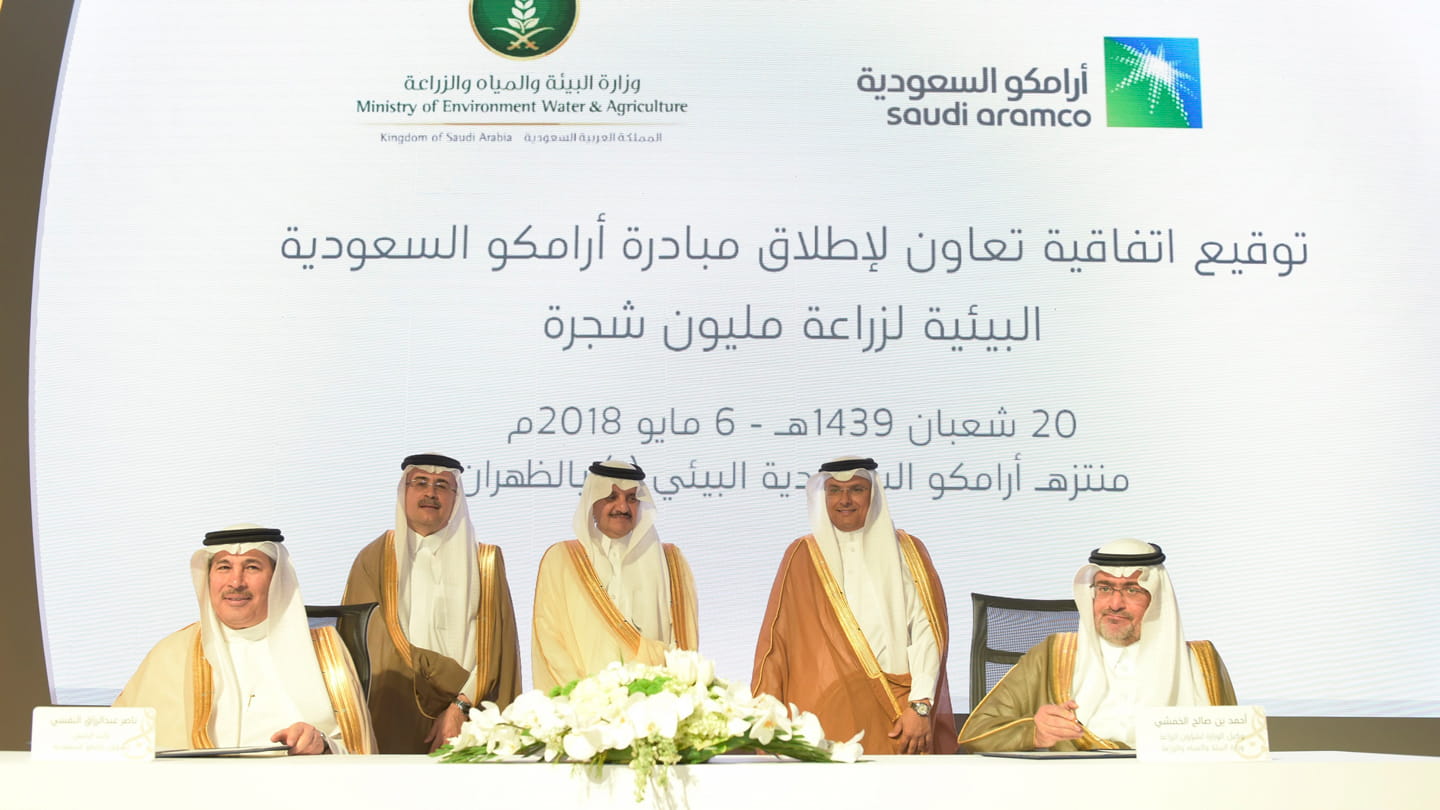A pledge to the Kingdom, a pledge to the environment

Deputy Minister Ahmed S. Aleyadah and Nasser A. Al Nafisee, Saudi Aramco vice president of Corporate Affairs, sign a Memorandum of Understanding to enhance coordination and activate procedures and measures necessary to maintain the ecosystem, natural vegetation, and in support of forestation. Watching from behind are HRH Prince Saud ibn Nayef ibn ‘Abd Al-‘Aziz Al Sa’ud, Governor of the Eastern Province; Amin Nasser, president and CEO of Saudi Aramco; and Mohammed Y. Al Qahtani, Saudi Aramco senior vice president of Upstream. (Photo: Moayed Al-Qattan/MPD)
Under the patronage of HRH Governor of the Eastern Province Prince Saud ibn Nayef ibn ‘Abd Al-‘Aziz Al Sa’ud, Saudi Aramco on Sunday launched an ambitious environmental stewardship initiative to plant 1 million trees native to Saudi Arabia throughout the Kingdom by 2025.
The “Saudi Aramco Environmental Initiative for Planting One Million Trees” follows the company’s successful project of planting 2 million mangrove trees along the shores of the Arabian Gulf coast, which was completed in 2017, and is in keeping with Saudi Aramco’s ongoing effort toward nurturing the Kingdom’s biodiversity. These environmental stewardship efforts are also aligned with Saudi Vision 2030, as well as the United Nations conventions on conserving biodiversity.
We are looking forward to creating a vegetation cover in order to reduce the effects of sandstorms and absorb 20,000 metric tons of carbon dioxide per year
Amin H. Nasser, Saudi Aramco president and CEO
The initiative will yield more than 20 million kilograms of carbon sequestration per year while also increasing shade and evapotranspiration, making the local areas cooler.
The beautification of the Saudi Arabia’s landscape, said Nasser, is an added benefit to the project.
Combatting desertification
Planting the native trees in strategic locations throughout the Kingdom will help to combat desertification, which essentially involves the movement of sand caused by loss of vegetation. Desertification happens due to several factors, including excessive harvesting of firewood, off-road driving, overgrazing, ineffective farming practices, and extended drought. It is considered one of the largest threats to sustainable development in the world today.
Trees, shrubs, and other plants play a vital role in stabilizing sand. Not only do tree roots help bind the sand together, but the plants themselves help to slow down the movement of wind over the landscape. Losing a large number of trees in desert areas can allow the wind to pick up loose sand and blow it into the air, creating large amounts of dust particles which can lead to sandstorms.
Native plants and trees
The Saudi Aramco initiative will utilize 26 species of native trees in harmony with the nature of Saudi Arabia. The native trees to be planted are adaptive to the challenges of surviving in the Kingdom’s environment, which includes low rainfall and highly saline soil and water.
Environmental experts have indicated that as much as 33% of all native plants and animals in the Kingdom are vulnerable to extinction, and one of the most important methods of restoring biodiversity is to plant native trees and bushes. These plants help to attract and enhance the survival rate of native animals.
Additionally, the native plants are considered culturally relevant to Saudi Arabia as the ancient Bedouin used many of the more than 2,500 species for food, medicine, cosmetics, and art for thousands of years, so the initiative is also helping to preserve this unique cultural heritage.
The native plants require less water than so-called “exotic” plant species, and the water that will be used for irrigation will be reclaimed wastewater. No groundwater will be used, thereby helping sustain the Kingdom’s precious groundwater resources.
Water-saving technology
In line with existing Saudi Aramco best irrigation practices, the company will continue to explore the most appropriate water-saving technologies for use in the initiative. One such technology is the use of polymers, which have been used in semi-arid areas to help reduce the amount of irrigation water required. The polymers are inserted into the soil near each plant to absorb and retain large amounts of water. The nearby plants are then able to tap into the stored water within the polymers. The feasibility and suitability of this, and other water-saving technologies, will be investigated over the course of this initiative.
Other benefits of the initiative include increasing surface and renewable water table levels by reducing temperatures, and the absorption of carbon dioxide to help decrease pollution.
Other examples of commitment
The initiative represents another significant Saudi Aramco contribution toward enhancing sustainability, ecological balance, and biodiversity. In the past five years alone, the company has undertaken numerous large-scale biodiversity initiatives, including:
- Creation of a 637 km2 fenced protected area at Shaybah to preserve over 200 species of native and migratory animals and plants
- Reintroduction of the Arabian oryx, Arabian sand gazelle and ostrich to the Shaybah Wildlife Sanctuary after they had been extinct in the region for decades
- Planting of 2 million mangroves along the Arabian Gulf coast
- Protection and restoration of internationally significant wetlands west of Abqaiq
- Construction of a mangrove eco-park at Tarut Bay
- Mapping of the distribution and abundance of every bird species in Saudi Arabia
- Production of the Marine Atlas of the Western Arabian Gulf
- Production of the Field Guide to the Biodiversity of Dhahran
- Conducting comprehensive biodiversity surveys at numerous Saudi Aramco facilities around the Kingdom, including in Abha, Abqaiq, Bahra, Dhahran, East-West Pipelines, Haradh, Khurais, Khursaniyah, Medina, Midyan, Safaniyah, Tanajib, and ‘Udhailiyah, among others.
Media contact information
All media enquiries are handled by Aramco’s Media Communications & Coordination Department, Dhahran, Saudi Arabia.
For media inquiries, please email us at media.inquiries@aramco.com

